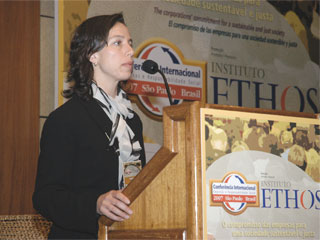Sustainability movement, the new game
For each environmental challenge, there is always an opportunity for generating new sustainability paradigms
Mobilization around an idea rather than people. This was the Instituto Ethos’ 2007 Conference organizers choice. Instead of opening the event around a big shot, the option was to disclose to the public gathered at the Hotel Transamérica, in São Paulo, the results of the research entitled “Raising Our Game – Can We Sustain Globalization?”, carried out by SustainAbility, which shows the major global scenarios facing the future of Governments, companies and people.
The presentation, given by Jodie Thorpe, manager of SustainAbility’s Emerging Economies Programme, showed that the globalization movement already accounts for 20% of the world GDP. It has gone through a massive acceleration in the last 20 years, with emerging economies surging onto the globalization field - like China, India, Brazil and South Africa -, trying to shift the rules of globalization in their favor. China and India, with impressive growth rates, show that they are succeeding.
However, as the research points out, this growth has major sustainability consequences such as environmental degradation. These very countries are collectively already responsible for 30% of global GHG emissions, mainly carbon dioxide, gas emitted by the consumption of fossil fuels in the energy and transport sectors and in the burning of forest biomass.
Seven recommendations were made as action guidelines:
1 – Plan for the Unexpected – It will be vital to build in flexibility whether in technology platforms, supply-chains, or human resource policies.
2 – Find True South – The extent to which the interests of the emerging economies will clash with those of the developed North can scarcely be exaggerated. There are regions and cities where development needs are highest.
3 – Don’t Expect Nice Companies to Come First – Even the best corporate citizens can be damaged by scandals, controversies, and economic discontinuities. The capacity to create true blended value is what really matters.
4 – Co-Evolve Earth’s Immune System – Be part of the solutions in social and ecological crises. Serve as a source of intelligence – and creation.
5 – Think Opportunity – and Innovation – Reframe social and environmental issues not just as risks but also as sizeable opportunities.
6 – S-t-r-e-t-c-h – The scale of the challenges is immense and will require radical approaches. Leaders will need to reach beyond their comfort zones in finding new models, and new partners in sourcing – and scaling – solutions.
7 – Do the Politics – This agenda is now political. Get involved and take stands.
The evaluation of each of the scenarios shown by the report involves gains and losses. The research shows opportunities for each of the situations – involving risks or crisis – and not just identifies problems. Jodie Thorpe believes that this work should be very useful for organizations that want to move towards sustainability scenarios. According to her, the time has come for us all to raise our ambitions, and raise our game.
Fonte: Instituto Ethos

> Petrobras Watch the Petrobras coverage
© Copyright 2007, Instituto Ethos de Responsabilidade Social Empresarial. Todos os direitos reservados






